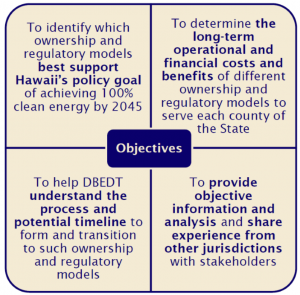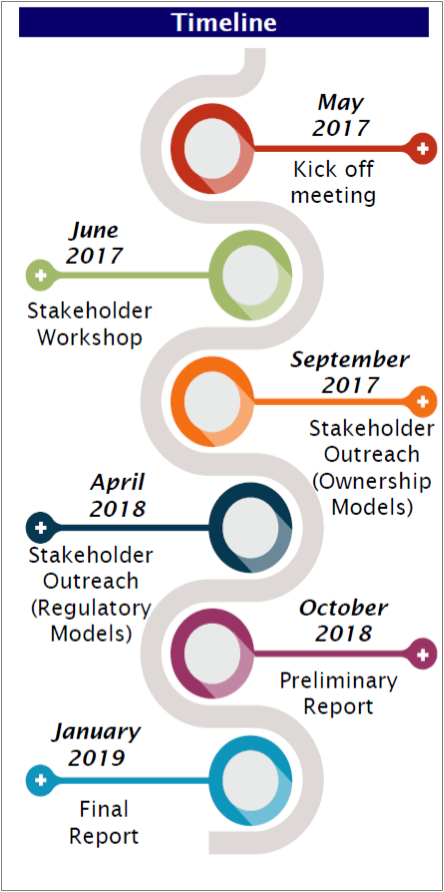June 2019 Update
From Hawaii State Energy Office, June 5, 2019
The final report has been published. Please use the links below to access the report and the slides from the public briefing.
Evaluation of Utility Ownership and Regulatory Models for Hawaii
Task 1: Review of potential ownership models that could be applied in Hawaii and their ability to meet state objectives
Task 2: Review of potential regulatory models that could be applied in Hawaii
Task 3: A high-level assessment of whether benefits of ownership and regulatory model changes can be accomplished through changes in rate design
Presentation from June 5, 2019 Briefing
Background
At the request of the state legislature, the Hawaii State Energy Office is embarking on a study to evaluate the costs and benefits of various electric utility ownership models, as well as the viability of various utility regulatory approaches, to aid Hawaii in achieving its state energy goals.
Through a competitive sealed proposals procurement, the Hawaii State Energy Office contracted London Economics International, LLC to perform a study to evaluate utility and regulatory models for Hawaii. The study is expected to be completed by June 2019.
The goal of the study is to evaluate utility ownership and regulatory models in Hawaii and the ability of each model to:
1. Achieve state energy goals;
2. Maximize consumer cost savings;
3. Enable a competitive distribution system in which independent agents can trade and combine evolving services to meet customer and grid needs; and
4. Eliminate or reduce conflicts of interest in energy resource planning, delivery, and regulation.
The study shall aid in understanding:
1. The long term operational and financial costs and benefits of electric utility ownership and regulatory models to serve each county of the state;
2. The process to be followed to form such ownership and regulatory models and;
3. If establishing such models would create synergies that are not currently available, particularly in the areas of:
- Increasing local control over energy sources serving each county
- The ability to diversify energy resources
- Economic development
- Reducing greenhouse gas emissions
- Increasing system reliability and power quality
- Lowering costs to all consumers
The study will engage a wide range of stakeholders and perspectives across all islands, providing multiple opportunities for input and participation. See Community Meetings and Working Sessions page.
Study objectives and timeline:


Comments may be emailed to dbedt.utilitybizmodstudy@hawaii.gov.
---30---
Coverage: